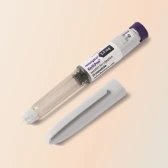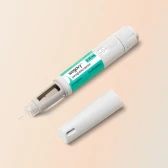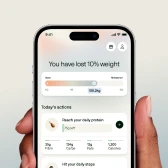The term “metabolic age” has been cropping up in wellness and fitness circles lately. It’s part of an emerging theory surrounding metabolism, and how quickly your body burns calories. But what is metabolic age?
Your metabolic age—which can differ from your chronological or actual age (how long you’ve been alive)—supposedly tells you what your ‘biological age’ is. It’s based on how efficiently your body burns calories compared to other people in your age group, among other health and fitness markers. As the theory goes, a low metabolic age suggests you’re healthier and that you may find it easier to lose weight.
It’s important to know that metabolic age isn’t an official medical term. Research around it is lacking, and doctors won’t normally check it. It’s certainly not something to be concerned about. Still, understanding what might impact your metabolic age may be useful if you’re keen to improve your health.
Metabolic age meaning
What does metabolic age mean? It’s how your metabolism compares to the average for people of your actual age. As the theory goes, if your body burns calories quicker than your peers, you’ll have a metabolic age lower than your actual age. It’s suggested that if your metabolic age is lower than your actual age, you’re healthier (and more able to lose weight). If it’s higher, this could be a sign that you need to make some improvements.
You may have heard people say: “My metabolism isn’t as fast as it used to be when I was younger.” Scientific evidence around age and metabolism (or “metabolic rate”—the rate at which your body burns calories’—to be more precise) is patchy though. One study found that as we age, our metabolic rate slows down. It speeds up in our first year of life, and then gradually slows throughout adulthood. But it’s not clear-cut enough to say that your metabolic rate slows down because we get older. Most research finds that genetics, sex, age, body composition (such as how much muscle you have), exercise, and health conditions may impact it more than age.
Remember, metabolic age isn’t an official medical concept that’s recognised by clinicians. And having a lower metabolic rate doesn't necessarily mean you’ll weigh more than someone with a higher metabolic rate.
Basal metabolic rate (BMR) and its role
Metabolic age can only be estimated once you know your basal metabolic rate, or BMR. This is the minimal amount of calories that your body needs to stay alive. We’re talking breathing, pumping blood around, and regulating temperature—which account for up to 65% of all the calories you use in a day. If you have a high metabolic rate, your body will burn more calories doing this than someone who has a low metabolic rate.
The most accurate way to calculate your BMR is through indirect calorimetry. A machine that most people don’t have access to is used to measure how much oxygen you use and carbon dioxide you produce.
You can try to estimate your BMR using an equation that takes your sex, height, weight, and chronological age into account. But there’s huge room for error here, so the results aren’t often accurate. There are a few different equations, but research finds the Mifflin-St Jeor Equation is the most accurate—it takes your activity level into account.
How is metabolic age calculated?
You might think working out your metabolic age (how your BMR compares to other people’s) would be easy once you’ve got your BMR down. But, as metabolic age isn’t an official medical metric, there isn’t a universal metabolic age calculator or equation you can use. You’d also need data about the average BMR for females by age, and average BMR for males by age to compare your result to. As this isn’t readily available, it’s almost impossible to work out your metabolic age on your own.
One 2019 study estimated peoples’ metabolic age using fancy software that most of us don’t have access to. They fasted, and then their diet was analysed over five days. Researchers also considered their body composition (the amount of fat, muscle, water, and bone), the circumference of their waist, and their resting blood pressure. Their metabolic age was calculated based on this information using an unknown formula. To get their relative metabolic age (which told them how their metabolic age compared to others’), their metabolic age was subtracted from their actual age.
Factors affecting metabolic age
It’s incredibly difficult to estimate and therefore improve metabolic age. But we do know what can impact your BMR.
Body composition
This means how much of your body is made up of muscle, fat, bone, and water. Muscle takes more energy to maintain, so you’ll burn more calories when resting if you have higher muscle mass.
Activity level
Obviously physical activity burns calories. But regularly exercising at least three times a week, and incorporating strength exercises into your routine, can boost your BMR even when you’re resting.
Diet
If you fast or dramatically cut your calories, your BMR may slow down as a way for your body to conserve energy. Consuming too many calories can also reduce it.
Genetics
Your genes may influence your BMR, but this is still being studied. Some people can also inherit metabolic disorders that affect BMR from their biological parents.
Hormones
It’s also possible to develop metabolic disorders due to hormonal imbalances (such as thyroid problems) which can impact BMR.
Overall health
Your general health also plays a part. Poor sleep and high levels of stress may lower your BMR.
How to improve your metabolic age
There’s no medically-backed advice on how to reduce metabolic age. But there are ways to potentially increase your BMR and improve your overall health.
Incorporate strength training
Your body burns more calories when it’s in rest mode when you have more muscle. Two strength training sessions a week can improve your muscle mass and BMR. You could try lifting weights, doing push-ups, squats, yoga, or cycling.
Maintain a healthy weight
If you have a BMI of 30 or above, losing weight could improve your BMR. Early research suggests that glucagon-like peptide 1 (GLP-1) agonists like the Wegovy weight loss injection and the Mounjaro weight loss injection may boost your metabolic rate.
Eat a balanced diet
When you regularly give your body a steady source of energy, your metabolism can work at its best. So avoid skipping meals and majorly reducing how many calories you consume. For a BMR-boosting balanced diet, try to eat these foods every day:
- Fruit and vegetables
- Starchy potatoes or pasta
- Dairy or dairy alternatives
- Protein-rich beans, fish, meat, or eggs
Your weight loss journey
Metabolic age is gaining popularity as a concept, despite not being an official medical term and being difficult to estimate. It’s definitely not something to obsess over. But knowing what can impact your BMR (a key indicator of how efficiently your metabolism works) may help you reach your health goals.
If the combo of diet and exercise hasn’t shown the results you’ve hoped for, new science-backed weight loss medications like Wegovy and Mounjaro may help. At Voy, you’ll get one-to-one support from our team of clinicians and coaches. They’ll check in and cheer you on at every step. Find out if you’re eligible now by taking this short quiz.












